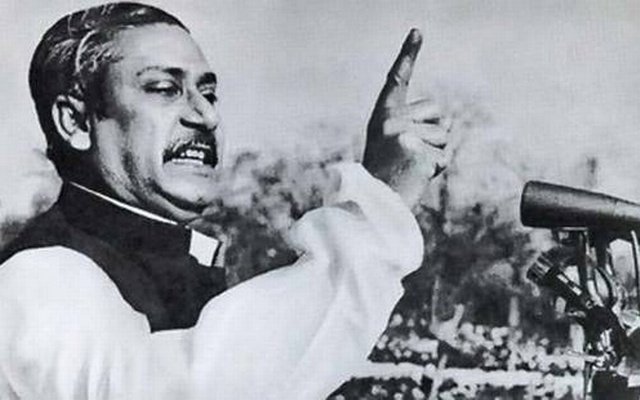Bangabandhu Sheikh Mujibur Rahman was an important figure in the political history of Bangladesh. He was a charismatic leader who played a significant role in the struggle for independence and the formation of the country. In this article, we will explore the political career of Bangabandhu Sheikh Mujibur Rahman and his contributions to the creation of an independent Bangladesh.
Early Life of Bangabandhu Sheikh Mujibur Rahman
Sheikh Mujibur Rahman was born on March 17, 1920, in Tungipara, a small village in present-day Bangladesh. He was born into a middle-class family, and his father was a government employee. He attended several schools, including Gopalganj Public School, Faridpur Zilla School, and Islamia College, Kolkata.
Political Career of Bangabandhu Sheikh Mujibur Rahman
Sheikh Mujibur Rahman began his political career by joining the Muslim League, which was a political party that aimed to create a separate Muslim state in India. However, he became disillusioned with the party’s policies, which he believed favored the West Pakistanis over the East Pakistanis. He left the party and became a member of the Awami Muslim League, which later became the Awami League.
In 1956, Sheikh Mujibur Rahman was elected to the East Pakistan Legislative Assembly, and he became the leader of the opposition. He used his position to demand greater autonomy for East Pakistan and to raise awareness about the political and economic discrimination faced by the people of East Pakistan.
In 1966, Sheikh Mujibur Rahman proposed the Six Points, which demanded greater autonomy for East Pakistan and called for a federal system of government in Pakistan. The Six Points became the foundation of the Awami League’s platform, and it gained widespread support among the people of East Pakistan.
In 1970, the Awami League won a landslide victory in the national elections, winning 167 out of 313 seats in the National Assembly. However, the Pakistani government refused to recognize the election results, and the military launched a brutal crackdown on the people of East Pakistan. Sheikh Mujibur Rahman was arrested and taken to West Pakistan, where he was imprisoned.
During the nine-month-long war of independence, Sheikh Mujibur Rahman became the leader of the Bangladesh Liberation Movement. He worked tirelessly to mobilize international support for the cause of independence, and on March 7, 1971, he delivered a historic speech at the Racecourse Ground in Dhaka, which is known as the “Six Points Speech,” in which he called for the independence of Bangladesh.
Legacy of Bangabandhu Sheikh Mujibur Rahman
On December 16, 1971, Bangladesh achieved its independence, and Sheikh Mujibur Rahman became the first president of the country. He worked to rebuild the nation and create a democratic, secular, and socialist state. However, his government faced numerous challenges, including political unrest, economic instability, and natural disasters.
In 1975, Sheikh Mujibur Rahman was assassinated along with most of his family members in a military coup. His death was a huge loss for the country, and it plunged Bangladesh into a period of political instability and violence.
You can also read: Why is Sheikh Mujibur Rahman known as Bangabandhu?
The assassination of Bangabandhu Sheikh Mujibur Rahman
The assassination of Sheikh Mujibur Rahman was a tragic event that took place on August 15, 1975. The assassination shocked the nation and plunged the country into a period of political instability and violence that lasted for several years.
The assassination was carried out by a group of military officers who were unhappy with Sheikh Mujibur Rahman’s leadership and policies. The group was led by Major Syed Faruque Rahman, who was a close aide of Sheikh Mujibur Rahman but later turned against him.
On the night of August 15, 1975, a group of military officers entered Sheikh Mujibur Rahman’s residence in Dhaka and opened fire. Sheikh Mujibur Rahman, his wife, three sons, two daughters-in-law, and several other family members were killed in the attack. Only two of his daughters, Sheikh Hasina and Sheikh Rehana, who were both living abroad at the time, survived the attack.
The assassination of Sheikh Mujibur Rahman was a devastating blow to the country. It created a power vacuum and led to a period of political instability and violence that lasted for several years. The country was ruled by a series of military governments and civilian governments, many of which were characterized by corruption, violence, and human rights abuses.
In the aftermath of the assassination, Sheikh Mujibur Rahman’s daughter Sheikh Hasina emerged as a prominent political leader. She led the Awami League and played a crucial role in restoring democracy to the country. In 1996, she became the prime minister of Bangladesh, a position she has held for several terms.
The assassination of Bangabandhu Sheikh Mujibur Rahman remains a painful chapter in the history of Bangladesh. It was a senseless act of violence that robbed the country of a visionary leader and plunged it into a period of turmoil and instability. However, Sheikh Mujibur Rahman’s legacy as a champion of democracy and human rights lives on, and his vision of a democratic, secular, and socialist Bangladesh remains a guiding principle for the country’s future.
Conclusion
Bangabandhu Sheikh Mujibur Rahman was a visionary leader who played a crucial role in the formation of Bangladesh. He was a champion of democracy and human rights, and his contributions to the country’s political history cannot be overstated. His legacy continues to inspire the people of Bangladesh, and his vision of a democratic, secular, and socialist state remains a guiding principle for the country’s future. Everyone should know the political career of Bangabandhu Sheik Mujibur Rahman to inspire themselves.


